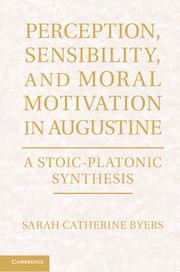Description
Perception, Sensibility, and Moral Motivation in Augustine
A Stoic-Platonic Synthesis
Author: Byers Sarah Catherine
Argues that Augustine assimilated the Stoic theory of perception into his theories of motivation, affectivity, therapy for the passions and moral progress.
Language: English
Subject for Perception, Sensibility, and Moral Motivation in Augustine:
116.52 €
In Print (Delivery period: 14 days).
Add to cart
Publication date: 11-2012
Support: Print on demand
Support: Print on demand
Description
/li>Contents
/li>Biography
/li>
This book argues that Augustine assimilated the Stoic theory of perception into his theories of motivation, affectivity, therapy for the passions and moral progress. Using his sermons to elucidate his treatises, Sarah Catherine Byers demonstrates how Augustine enriched Stoic cognitivism with Platonism to develop a fuller and coherent theory of action. That theory underlies his account of moral development, including his account of the mind's reception of grace. By analyzing Augustine's engagement with Cicero, Seneca, Plotinus, Ambrose, Jerome, Origen and Philo of Alexandria, Byers sheds new light on a major thinker of the early Christian world whose work is of critical importance for understanding key and recurring themes in Western philosophy.
1. Perception and the language of the mind; 2. Motivation; 3. Emotions; 4. Preliminary passions; 5. Progress in joy: preliminaries to good emotions; 6. Cognitive therapies; 7. Inspiration.
Sarah Catherine Byers is an Assistant Professor in the Department of Philosophy at Boston College. She has held research fellowships at the University of Notre Dame, the Pontifical Institute of Medieval Studies in Toronto and Villanova University, Pennsylvania. Her articles have appeared in the Journal of the History of Philosophy, the Review of Metaphysics, Augustinian Studies, A Companion to Augustine (2012) and Augustine's City of God (2013).
© 2024 LAVOISIER S.A.S.




